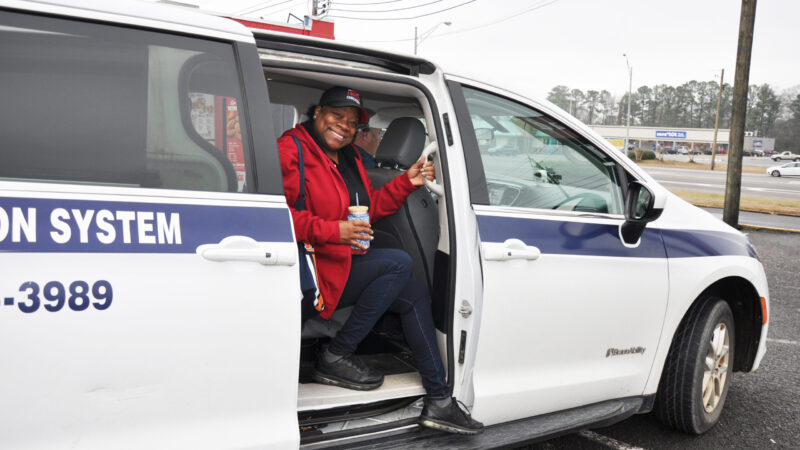College Fight Songs
Scott Clayton has a nightmare:
“Sometimes you’ll get some crazy people that’ll come in here and decide they want to push them all at the same time so it kinda sounds like a swarm of bees is going throughout the whole store. It makes you just want to, your head explode sometimes!”
Clayton manages Bama Fever/Tiger Pride, a school spirit shop in Birmingham, where you can buy everything from bottle openers to pet toys imbedded with microchips that play the fight songs for the University of Alabama and Auburn University. It got so bad, Clayton resorted to moving most musical items behind the sales counter.
“So that way they have to ask us if they want it.”
And boy do they want it, to the tune of $100,000 a year. That’s what Manhattan-based music publisher Carlin America makes on fight songs. Carlin bought the rights to more than 100 such songs when it acquired another publishing company in 1999.
“At the time it was a pretty sleepy catalogue with which not much had been done.”
But the market woke up, says Carlin president Caroline Beinstock, thanks to sports video games and cell phone ring tones.
“That’s always the hope, is that you unearth a jewel that turns out to be valuable to you.”
The fight songs in that catalog may have been Carlin’s diamond in the rough. But they’re useless to the schools like Alabama and Auburn, neither of which sees a penny in revenue from sales of these musical tchotchkes.
Auburn’s got the rest of the trinket market locked up. Susan Smith is Auburn’s school’s licensing director. She wades through an office packed with orange and blue stuff. The school makes more than $2 million a year licensing everything from barbecues to Christmas ornaments. But it missed the chance to cash in on its fight song back in the 50s. That’s when a loyal alumni commissioned a New York songwriting team.
“He paid for the song to be produced and he made an assumption apparently that it was his. But back then you didn’t think about having to have any attorney to sign off on everything you did.”
In fact, the songwriters retained the rights. They then sold the rights on to a music publisher. 50 years later, Carlin America bought them. Again, Carlin America’s Caroline Beinstock.
“It has to be remembered that for the sake of the writer, the opportunity to earn money from the use of their composition is really what they’re doing it for. And I doubt that the composer felt that there was unfairness associated with this, in fact they were all in favor of having it be represented professionally.”
Everything is fair game for those composers’ work these days. Door bells, car horns, even toilet seats! They’re all singing college songs. And generating lots of money. A good reason for schools to fight, fight, fight to hold on to their song rights.
Kalshi reveals insider trading case against editor for MrBeast
With prediction markets booming, so have concerns about insider trading. Now, Kalshi has disclosed its first public actions against accounts suspected of trading on confidential information.
Greetings from Jordan’s Wadi Rum desert, where patches of green emerge after winter rains
Wadi Rum's otherworldly landscape is where Star Wars movies and The Martian were filmed. In late winter, plants emerge in this desert — but some are toxic to camels, so their herders must protect them.
Lack of transportation keeps many Alabamians from working. Rural public transit programs are trying to help
While lack of transportation is a major employment barrier in Alabama, few people take public transit to work. That dynamic is even more pronounced in rural areas.
When a horse whinnies, there’s more than meets the ear
A new study finds that horse whinnies are made of both a high and a low frequency, generated by different parts of the vocal tract. The two-tone sound may help horses convey more complex information.
Hundreds of American nurses choose Canada over the U.S. under Trump
More than 1,000 American nurses have successfully applied for licensure in British Columbia since April, a massive increase over prior years.
Trump’s many tariff tools mean consumer prices won’t go down, analysts say
The Supreme Court struck down President Trump's signature tariffs. But the president has other tariff tools, and consumers shouldn't expect cheaper prices anytime soon, economists say.






